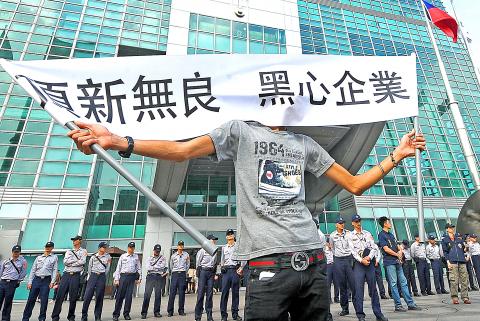Ting Hsin International Group (頂新國際集團) chairman Wei Ying-chiao (魏應交) yesterday bowed to public and government pressure and relinquished his posts at Taipei Financial Center Corp (TFCC, 台北金融大樓公司), the firm that operates Taipei 101.
Wei, the elder brother of Wei Ying-chun (魏應充), who has been detained over alleged involvement in an oil adulteration scandal, offered to resign as TFCC vice chairman and president, Vice Minister of Finance Wu Tang-chieh (吳當傑) told a media briefing yesterday afternoon.
The elder Wei’s move came after government-appointed board directors at TFCC suggested that he voluntary resign to protect the company’s image at a board meeting in the morning.

Photo: Fang Pin-chao, Taipei Times
Wei Ying-chiao initially resisted the call, saying he acknowledged their opinions, but needed more time to think about the issue, TFCC spokesman Michael Liu (劉家豪) said, declining to speculate on Wei’s intentions.
However, the elder Wei tendered his resignation at 2pm to TFCC chairwoman Christina Sung (宋文琪), averting a showdown with the finance ministry.
A day earlier, the finance ministry had demanded that Ting Hsin should yield all its management posts at TFCC to the government.
The government owns a 44.35 percent stake and six seats on TFCC’s 13-member board, while Ting Hsin controls a 37.17 percent stake and has five seats, Wu said. CTBC Financial Holding Co (中信金控) and Cathay Financial Holding Co (國泰金控) own 7 percent and 6 percent stakes respectively and have one seat each, the vice finance minister said.
All the government-appointed directors rallied behind Sung after she said that Wei Ying-chiao should step down to help TFCC operate more smoothly.
Sung is to take over Wei Ying-chiao’s responsibilities at TFCC until the company finds a successor at its next board meeting later this week, the vice minister said.
Wei Ying-chiao would retain his seat on TFCC’s board, but his younger brother had forfeited his amid the tainted oil investigation, Wu said.
At noon, Minister of Finance Chang Sheng-ford (張盛和) said the ministry would call a board re-election and oust Wei Ying-chiao if he refused to resign.
The tainted cooking oil scandal has sparked a public outcry and scores of protesters staged a demonstration outside Taipei 101, demanding that the Wei family quit control of the landmark building and leave the local market altogether.

The US government has signed defense cooperation agreements with Japan and the Philippines to boost the deterrence capabilities of countries in the first island chain, a report by the National Security Bureau (NSB) showed. The main countries on the first island chain include the two nations and Taiwan. The bureau is to present the report at a meeting of the legislature’s Foreign Affairs and National Defense Committee tomorrow. The US military has deployed Typhon missile systems to Japan’s Yamaguchi Prefecture and Zambales province in the Philippines during their joint military exercises. It has also installed NMESIS anti-ship systems in Japan’s Okinawa

TRAGEDY STRIKES TAIPEI: The suspect died after falling off a building after he threw smoke grenades into Taipei Main Station and went on a killing spree in Zhongshan A 27-year-old suspect allegedly threw smoke grenades in Taipei Main Station and then proceeded to Zhongshan MRT Station in a random killing spree that resulted in the death of the suspect and two other civilians, and seven injured, including one in critical condition, as of press time last night. The suspect, identified as a man surnamed Chang Wen (張文), allegedly began the attack at Taipei Main Station, the Taipei Fire Department said, adding that it received a report at 5:24pm that smoke grenades had been thrown in the station. One man in his 50s was rushed to hospital after a cardiac arrest

‘WIN-WIN’: The Philippines, and central and eastern European countries are important potential drone cooperation partners, Minister of Foreign Affairs Lin Chia-lung said Minister of Foreign Affairs Lin Chia-lung (林佳龍) in an interview published yesterday confirmed that there are joint ventures between Taiwan and Poland in the drone industry. Lin made the remark in an exclusive interview with the Chinese-language Liberty Times (the Taipei Times’ sister paper). The government-backed Taiwan Excellence Drone International Business Opportunities Alliance and the Polish Chamber of Unmanned Systems on Wednesday last week signed a memorandum of understanding in Poland to develop a “non-China” supply chain for drones and work together on key technologies. Asked if Taiwan prioritized Poland among central and eastern European countries in drone collaboration, Lin

ON ALERT: Taiwan’s partners would issue warnings if China attempted to use Interpol to target Taiwanese, and the global body has mechanisms to prevent it, an official said China has stationed two to four people specializing in Taiwan affairs at its embassies in several democratic countries to monitor and harass Taiwanese, actions that the host nations would not tolerate, National Security Bureau (NSB) Director-General Tsai Ming-yen (蔡明彥) said yesterday. Tsai made the comments at a meeting of the legislature’s Foreign Affairs and National Defense Committee, which asked him and Minister of National Defense Wellington Koo (顧立雄) to report on potential conflicts in the Taiwan Strait and military preparedness. Democratic Progressive Party (DPP) Legislator Michelle Lin (林楚茵) expressed concern that Beijing has posted personnel from China’s Taiwan Affairs Office to its